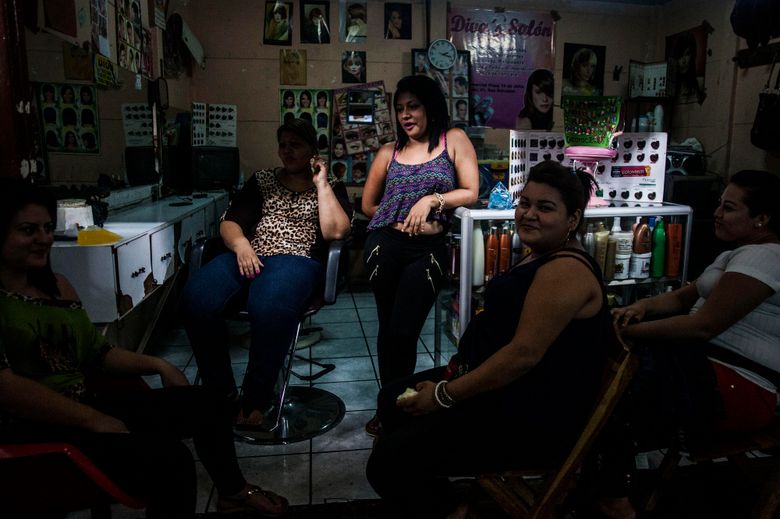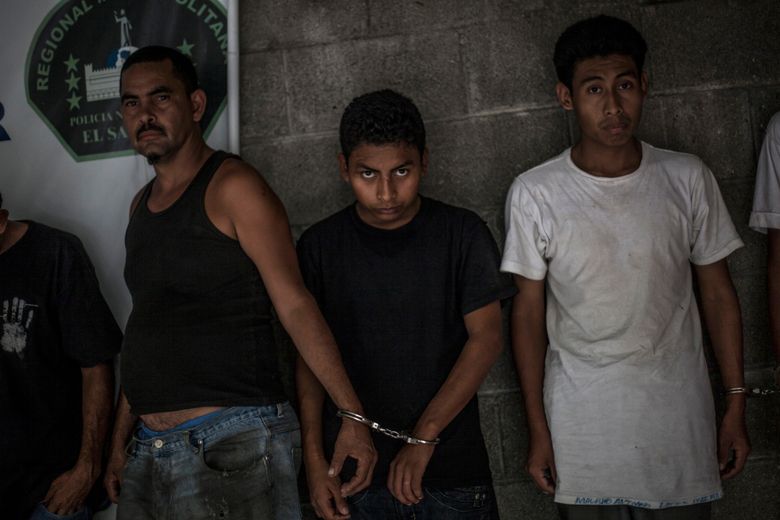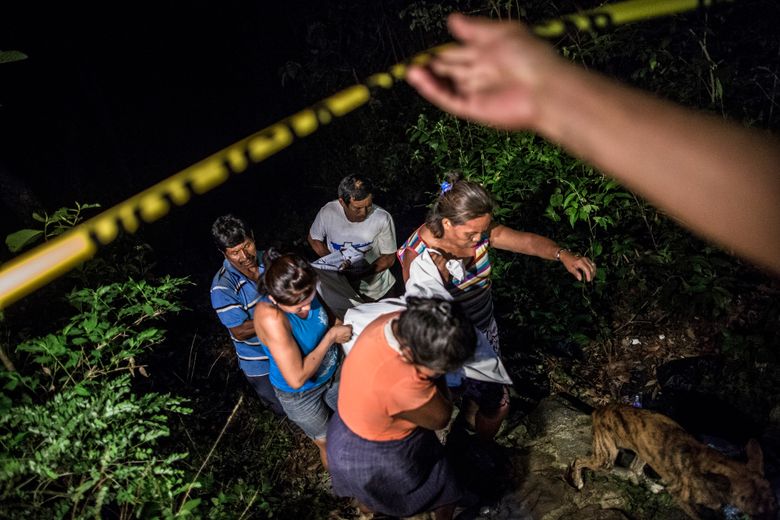El Salvador's Breakdown
"They also say you can't wear yellow red clothing."
"Can you believe it? They've already attacked a woman on a bus for wearing yellow."
"You don't wait for clarifications. These people are crazy and they will kill you."
Claudia Vastellanos, beautician, San Salvador, El Salvador
 |
| In this June 12, 2015 photo, hairdressers take a break from their work at a hair salon in downtown San Salvador, El Salvador. Violence in El Salvador is reaching a level that rivals the worst days of guerrilla warfare decades ago, few are willing to risk becoming a target. Word on the street is that only the girlfriends of gang members are allowed to be redheads or blondes. So in this violent place, women are scurrying to salons to give up their blond hair and highlights, to dye it all black, not out of fashion sense, but out of fear. (AP Photo/Manu Brabo) |
"You take away the mature leadership, and you get a structure that is made up of younger, fanatical people who want to make a name for themselves. They want war."
Raul Mijango, former guerrilla, truce facilitator
"Things have to get worse before they get better."
"When I see one (gang member) on the street, I'm going to shoot him before he shoots me."
Police official
"These jerks lurk around the schools and offer everything to join the gang. If you refuse, they kill you."
"I will do everything to protect my children."
Carlos Treminio, street vendor, father of teens
El Salvador has seen bloody violence at levels similar to those of the civil war two decades ago. When night falls stores owners succumb to their fears by closing early. Streets suddenly empty of people. Roadblocks meant to thwart grenade attacks on police stations go up. Police sleep in those stations in preference to taking a bus home and being vulnerable to attack. Taxis take precautions to make themselves less visible.
A truce had been established in 2013 between government and the gangs that troll for trouble. Gang leaders incarcerated for their crimes were moved under the agreement from the maximum-security prisons that securely held them incommunicado, to more relaxed facilities where they were enabled to once again head up their criminal gangs, albeit remotely. All that changed in January with a change in government.
 |
| In this May 28, 2015 photo, suspected members of the 18th Street gang stand handcuffed in pairs at a police station in Panchimalco, near San Salvador, El Salvador. A new government announced officially an end to the 2013 gang truce in January, returning leaders to maximum security and starting aggressive attacks and arrests, leaving the streets to younger and more reckless criminals. (AP Photo/Manu Brabo) |
President Salvador Sanchez Ceren in January rejected the truce and initiated an aggressive crackdown on criminals, while placing the gang leaders back into their maximum security cells. Their leadership diminished, no longer in charge, the streets have come under control of younger criminals, well armed and reckless. The police say they are prepared to meet the challenge. Their crackdown on gangs has seen some members flee to rural areas and with them goes the violence they represent.
In the town of Olocuitia, located 30 kilometres south of San Salvador, the corpses of two teens were discovered in a gully post-shootout with police. It was the site of an old cattle stable, turned into a shooting range by gang members. A 16-year-old with a grenade in his hand was one of the dead; he was the leader of the cell.
 |
| In this May 27, 2015 photo, relatives of a Mara Salvatrucha gang member retrieve his body from a steep gully after he was shot dead in a confrontation with police, in Olocuilta, El Salvador. Two bodies were found at the bottom of the gully following a shootout that began near an old cattle stable, which gang members had turned into a shooting range. (AP Photo/Manu Brabo) |
The assistant national police chief, a former guerrilla commander, Howard Cotto explained his belief that the gangs, absent an ideology will fail to find rural support such as that given in the 1980s to rebels. Still, it is his belief that the situation is not amenable to change for the better until the problems of poverty and lack of employment for young people are adequately addressed.
Although the government has arrested 12,000 gang members in the last year alone, it is meaningless. "We can go in and arrest 50 gang members and 50 more will take their places. With just arrests, we won't accomplish anything". The month of May saw 635 reported homicides, in a country of slightly over six million people. It is anticipated that June statistics will see even greater numbers of murders.
Little wonder then, that people are terrified and take whatever precautions they can to preserve themselves from the harm that lurks around every street corner when dusk falls.
Labels: Crime, El Salvador, Employment, Human Rights, Poverty, Violence

<< Home